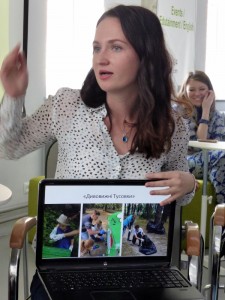The activists of „Dyvovyzhni“ use small tools to change the attitude of people. Like painting the entrance of an average apartment block. Sounds like no big deal? It is!
There are many stories on how people change their society or community for the  better. However, most initiatives rely on people who made the first step to active citizenship themselves. Maria Nasiedkina’s NGO „Dyvovyzhni“ is a wonderful example of a different kind.
better. However, most initiatives rely on people who made the first step to active citizenship themselves. Maria Nasiedkina’s NGO „Dyvovyzhni“ is a wonderful example of a different kind.
Find Dyvovyzhni on Facebook or visit the Website
The typical entrance of an five-storage apartment block looks rather neglected. The stairs have started to crumble. The initial painting has faded, doors and walls are covered with the scraps of advertisement and graffiti. There is litter around. Inside, the corridor is usually no better…
„The typical attitude of the inhabitants is, that always someone else should do something about it. The the administration, the mayor…”, says Maria. She and her fellow activists want to engage the people in the particular house to take action themselves, and — by doing this — to develop an attitude of involvement and responsibility towards their very community. To understand, that they actually can make change.
“People are at first usually suspicious. They wonder, ‘Who are you?’, ‘Why would you want to spend money on this?’, ‘Are you political?’” Dyvovyzhni’s approach is to find a person in or outside the house who is connected to the inhabitants. This person does the first step to the people and helps building trust. “We only work with people who have sympathy for our idea.” So, sometimes it is a long way until the inhabitants meet and paint the walls of the entrance in a common effort.
What motivates people – some lessons learned
After such a project is finished Dyvovyzhni provides a kind of toolbox for the people involved to keep on working in that spirit of community and engagement they have just developed.
“There is no red button to activate community”, says Maria. But she has a few tips and learnings for those who want to:
-
The first very important: Don’t enter a space like you’re all knowing and everyone should just do what you say to be fine. Be passionate — but be humble.
-
Engage all people in every stage of your initiative.
-
Ask for feedback and show that you consider it.
-
Look for local leaders who have the trust of the community. Otherwise you’re just a stranger from outside.
-
Demonstrate you’re prepared to take action yourself. Be the good example. Do not just preach.
The power of small
There’s another reason why Maria favours small scale projects to change peoples mind about their role as citizens of a community. That is to be able to make an impact from the start, which is of big importance when you try activate people. “People can tell you about a lot of problems. You need to identify one or two specific and you need to have the capacity to do something about it.” That is also important for word-of-mouth-communication: The need to show something concrete.
Common believe goes that people would get involved when a problem is presented as particular big as it creates more urgency. But in fact, too big problems often rather frustrate and lead to apathy as ‘I can not do anything about this anyway’. “What motivates people is the feeling that ‘I could do that too!’. But therefore, someone needs to do the first step.”
Dyvovyzhni also does clean up activities with children. Always the aim is to draw people in: it is your park, your yard! “We try to make them think and talk about their community and develop a different view.”
Author’s note: Christine met Maria at the Congress of Cultural Activists’ Networking Weekend in Kiev, Ukraine, April 2016.

